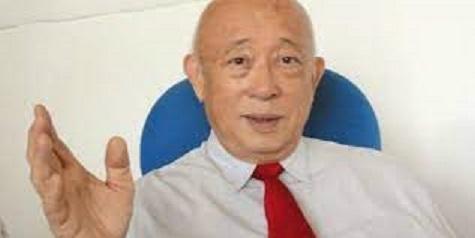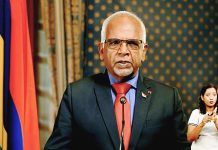Africa-Press – Mauritius. A period of political turbulence is announced in the days to come, turbulence which could mainly affect the MMM in the wake of the by-election in No. 18.
Voices are opposed as to the correctness of renewing the governing bodies of the party, some preferring instead an in-depth examination of the internal causes of the successive defeats of the MMM.
There is for the moment no direct confrontation against Paul Bérenger, but according to the press some, within the MMM, are already asking questions about the leadership of the party.
Is it cyclical or do you see, on the contrary, that these leaders “dig their heels” to better establish their hold on their respective parties? What do you think ? Joseph Tsang Man Kin: No, the MMM will not go through a period of turbulence.
Turbulences are only encountered during transitions, that is to say during the difficult passage from one situation to a new situation, with interference from the outside.
However, at the MMM, there is no movement, no transition. . . He is static, he is paralyzed, without the will to move, to change, to transform himself.
Besides, no headwind comes from outside to embarrass him. . . We cannot therefore speak of turbulence. It is rather decay that plagues the party which has no ideal, no direction, no social project.
We wonder about its raison d’être and we see none. Moreover, this was confirmed by the poor performance of this party at No. 18, the candidate being beaten by nearly 5,000 votes.
I do not want to be unfair, but how not to note that the MMM has remained an appendage in the Mauritian body politic? We don’t know what it’s used for today.
Moreover, the MMM has never had any social project. Like his party, Bérenger, born in 1945, is tired and clueless, but he will hang on. Besides, he knew how to create a vacuum around him.
And those who wanted to introduce reforms have been pushed out the door, and there will always be petty second-rate politicians who dream of replacing him, but they have no chance, which means the MMM will continue to be beaten in all the next elections in the country.
The MMM has become a trickle with the resignation of its most faithful and devoted lieutenants. . . There will be no more MMM after the departure of Bérenger.
The MMM has no future. Many followers realize that they followed and sacrificed their youth in vain. Last December, there was even a Facebooker, a lady, who cried because of the MMM that she no longer recognized.
* The PMSD is still looking for an honorable arrangement, after rejecting the offer of “backbenchers” from the Minister Mentor, and only the PTr is showing optimism after the victory of Arvin Boolell.
Is the MMM and PMSD opposition collapsing, in your opinion? First to the PMSD: despite the disappointing performance of this party in No. 18, I still believe that the PMSD, unlike the MMM, is better placed.
He has every chance of benefiting from an awareness of the Creole community. The latter becomes acutely aware of its identity and its importance on the political spectrum.
The Creoles, disappointed by the MMM, are eyeing the side of the PMSD, perceived as more stable and more motivated for the defense of the general population.
It is not surprising that the PMSD seeks to enter the government, except that it relies on its growing popularity which will make it an essential party and which will be highly courted on the eve of the elections scheduled for 2019.
other words, even if he enters the Government today, it will only be one more adventure. The MMM opposition and the PMSD opposition are not comparable at all.
On the other hand, the PMSD is lucky to have a relatively young leader who surrounds himself with young people, a party that renews itself, which is a considerable asset against the MMM whose leader is now a trinket that we keeps among his memories.
Above all, we must not forget the prestigious past of Gaëtan Duval’s party, whose contributions have marked the development of the country, its role in the field of tourism and support for the Labor Party, which has been its natural ally, among others.
Whatever his frequentations or his infidelities, the PMSD is the natural companion of the Labor Party with which he will end his days. No wonder the two divorcees will remarry on the eve of the next elections and together form the next government of 2019.
Of course, in this context, only Labor is confident and can afford to wait for the fruit to ripen and fall into its mouth in 2018. * So far there has been no questioning of the leadership of the PMSD, nor at the level of the PTr either, although the position of Arvin Boolell, who does not hide his ambitions to lead the party, has reinforced since the last part…
There will be no questioning of leadership either at the PMSD or at the PTr. Arvin Boolell does not have the appetite it takes to eat a lion. Nor at the MMM, either, for the simple and good reason that there are no political parties as such in Mauritius.
We have a leader and followers. Followers are chosen and admitted to governing bodies, not to discuss or formulate social projects but to support the leader.
There is never a debate on the major issues that affect society or on the projects of Mauritius. The MMM and the PTr together approved the draconian and anti-democratic projects of their respective leaders, Ramgoolam and Bérenger.
If there had been debate by free and patriotic men within these parties, they would have rejected, without hesitation, the banana republic project of these two leaders.
By their lack of courage and their accomplice support, they therefore led their leader and their party to disaster, the consequences of which are felt until now! They were soundly beaten in the elections, which shows that these two parties did not function as parties to reject the bogus project, but as dangerous accomplices! Thank you voters!
Nope ! We do not have political parties but a leader at the head of a group of followers who do not think but execute. . . In other words, these leaders have nothing to do, nor to fear: they will remain at the head of their party without problems.
* The current difficulties of the MMM and the PMSD do not mean that the situation is improving for the Government in place.
The first year of Pravind Jugnauth’s prime ministership was rather trying, with the PM having to manage the escapades of his entourage within the government alliance.
What is your opinion of the management of state affairs by the son of Sir Anerood Jugnauth? The MMM has difficulties, of course, and is in a much less comfortable situation than the PMSD.
But these difficulties of the two parties of the Opposition make life easy for the Government that they are unable to challenge. In their waltz-hesitation, with the hope of being called to be part of the Government, the opposition in Parliament is a scarecrow that is useless.
The harsh criticism of the acts and gestures of the Government is heard, not in Parliament, but especially in the street, at the market, on the social network.
The rumble is in the people, not in Parliament. So, not receiving the full face of the anger of the people of the people, the Prime Minister was able to spend a relatively peaceful first year.
The first subject that should have unleashed anger in Parliament, namely the Metro Express project, did not worry or embarrass the Prime Minister and his government much, which means that the Government can safely despise and insult the people.
I must add that the Prime Minister is not really helped by his entourage, which creates a lot of useless problems for him, which he is called upon to manage, which causes him to waste precious time, which he could have used in a more beneficial to the country.
Moreover, it is a terrible admission of incompetence by the Government, which is unable to find a man of confidence and competence to whom to entrust the post of Minister of Finance.
Nowhere do we see the same minister being both Prime Minister and Minister of Finance. . . Dare to say it: it is bad governance, paving the way for conflicts of interest.
To tell the truth, I pity him because, apart from his enormous official responsibilities at the head of the country, when he should have free rein, he has a sword of Damocles, with the MedPoint affair, which can fall to n any time.
The sword can fall next to it and not touch it. But the sword could just as well fall directly on his head… What a disaster for the country! It makes me worried to think about it.
This would be entering a period of catastrophic instability for the country, then tarnished, and very damaging to the country’s reputation on the international scene.
* Pravind Jugnauth has reiterated on many occasions his determination to stay the course until the end of his government’s mandate.
Turning the tide seems difficult to achieve, because populist measures – the minimum wage, the Negative Income Tax, etc. – have come to nothing. How does the future look for this party and its young leader?
Of course, he is right to publicly reaffirm this desire, even if he is not sure he can stay the course, because he must reassure our international partners.
But does it depend on him alone? And as I said earlier, he gives me the impression of wanting to do the right thing, while his own sometimes rude and violent ministers seem to be desperate to destabilize him.
The Prime Minister has made a good decision to grant the minimum wage, which has been awaited for decades. Nope ! I will not say that the measures he adopted are populist. Nor will I say that this measure did nothing. Think of the unfortunates who will now be able to add a few thousand rupees to their income.
This is not an easy task ! Let’s give Caesar what is Caesar’s, so I say he did well! The shame is on the trade unionists, these hundreds who have been in place for decades and who have taken no pains to lead this fight which they have not won, moreover.
Despite the negative comments from a section of the local press, I believe the Prime Minister wants to show his sympathy for his less fortunate compatriots. The future of Pravind Jugnauth? Certainly, I have spoken of the sword of Damocles which hangs over his head.
But if he survives him, Pravind Jugnauth, given his young age, being born in 1961, has every chance of being present on the political scene for a long time to come.
His strength is that his party has a headquarters and considerable financial means. * For lack of a credible alternative, it is the game of musical chairs that will intervene.
It is still and always the same ones who have shared power among themselves and in turn for decades. It’s hard to get out of this logic, isn’t it? Exact ! The whole country is condemned to have, if not to submit to the same leaders, the same parties.
The only way to break the chain would be to change the electoral code. The voters happen to be more and more numerous to no longer want to suffer this fatality.
They can choose to no longer vote for the candidates proposed by the party leaders, but decide to vote for the man and not the party. Their choices will then be able to focus on competent, honest, experienced, and hardworking people, regardless of their party.
* Navin Ramgoolam announced, last November, a series of measures to, he says, “give hope to the population”, including those aimed at increasing participatory democracy and the participation of young people and women in politics, l ‘introduction of a ‘Freedom of Information Act’ and an anti-defector law, the appointment of the heads of parastatal bodies by a parliamentary committee, etc.
Good intentions, you say? Let us therefore come first to what would constitute, in the eyes of the leader of the Labor Party, a participatory democracy. So Navin Ramgoolam, born 1947, proposes the adoption of a ‘Freedom of Information Act’ or the “anti-defector law.
” »
The first question to ask is whether these proposals come from the party that would have first democratically participated in the debates and then adopted together these measures that are now proposed by the leader.
If there has not been a debate on this subject, then we will have deducted our participatory democracy, from the very start. It would be like the decision suddenly announced in his New Year’s message by PM Pravind Jugnauth that he proposes to introduce Kreol at the secondary level.
Who asked him to do this? Is this a decision taken after debates and discussions within his party, the MSM? Or without discussion or debate, which gives us a caricature of the participatory democracy towards which all societies in the world are tending today? Then, the question I ask myself is who is he addressing when he proposes to adopt a Freedom of Information Act or the “anti-defector law”.
Do you seriously believe that young people under 25 feel concerned by this project? Are these the things our young people today are asking for? How do these proposals affect them? I want to show by this that we can have good intentions but that we should make proposals while targeting the different categories of Mauritians – leaders can be cut off from the reality of their own country!
Attention ! If we are all supporters of Freedom of Information, there are others who would be for the freedom of the Member who should not be prisoner of a party and have the right and the freedom to change sides to keep their own ideals or those of his party.
Here, opinions are divided… Now let’s talk about young people and women. Do you think that with the massive entry of women and young people into the Government, there will be miracles in the governance of the country?
No, don’t kid yourself. These women or young people should first go through training that prepares them and equips them to take the reins of power tomorrow. It is not because you are a woman or a young person that you will be more competent.
What is very positive is that women have a more pragmatic approach to daily problems, being called upon to manage the family budget and knowing better than men the prices of vegetables and basic necessities, which makes woman once placed in a more practical, competent position of responsibility.
She sees obstacles and solutions often better than men. And young people, both men and women, are better informed than older people about their needs and know better than their elders what type of society they will want to live in tomorrow. Elders are already in their future, and do not always understand what young people want.
However, it is towards the young people that we must turn to understand what they want… I would like to take this opportunity to congratulate all these young people who had the courage to stand in the by-election in No. 18 ; this is a good sign for the future of the country.
It is for this reason that I have divided Mauritian society into three groups for the purposes of my analysis: Colonials, Independents and Republicans.
Colonials born before 1968 are over 50 years old and have experienced the colonial era. They are the ones who still carry or transport prejudices and community considerations.
The Independents were born between 1968 and 1992. They are therefore between 25 and 50 years old and have inherited some of the prejudices of the Colonials, which they are trying to get rid of.
They become aware of what is happening in the country, are uncomfortable and want change. The Republicans were born with the Republic in 1992 and are under 25 years old.
Most of them will vote for the very first time in the elections scheduled for 2019. They are not interested in the men of yesterday, do not care what they think and are in no way communitarian.
The future belongs to them and they are the future. Today it is the Colonials who run the country, often with their ideas of the past that have never been updated.
It is for this reason that they do not understand the new generations and are unable to address the Republicans that they do not understand. This is where we see the gap between the three generations who have different and contradictory aspirations.
Above all, the Colonials should become aware of what the Independents and the Republicans want. The Independents, with their energy and their ideas, can ally very fruitfully with the Colonials, and being closer to the Republicans and knowing them better, can serve as an interface between the Colonials and the Republicans.
Do the political parties have men or women who understand the changes that Mauritian society is currently undergoing and who would listen to these young Republicans, who have just obtained their SC or HSC certificate, small minority who are attending university at the moment or those who are looking for their first job?
* So you expect the path to participatory democracy to first go through a questioning of political parties and the organization, functioning and financing of these parties?
As I said earlier, we have no political parties to really talk about. A political party is a group of people who share the same vision for the future of a country.
They can be right-wing or left-wing and share an idea, if not an ideology, that inspires and motivates them. They reflect and debate together on the future of the country, agree on social projects, take collective decisions. This leads me to ask questions about the structure of our political parties.
Did they ever publish their organization chart? Do they have a branch to take care of recruiting, training new members, teaching the history of the party, its philosophy, its achievements and its place in the history of the country? And having become a very active Facebooker since November 1, I realized that many Mauritians do not know simple historical facts about our country.
But even worse, they have been taught falsehoods that they believe to be the truth! Too bad history is not taught in our schools, which means that in good faith, we start to peddle opinions that have nothing to do with the reality of the facts.
It would be interesting to hear the debates within political parties on the financing of political parties. We will then know who has the most appetite for public funds.
* What has been worrying many Mauritians for some time is the gradual weakening of the state or even its resignation from its responsibilities.
The composition of the Economic Development Board, recently established, is the latest in a series of decisions where the State leaves the field open to the private sector… How do you react to this? The nibbling – which began a long time ago – has now given the private sector long teeth. The latter has become more greedy than ever.
At independence, we inherited a distorted structure of economic and financial relations between a small handful of big owners of all the levers of power – banking, import-export, insurance, sugar – to which were added textiles, hotels , tourism and now supermarkets, malls, not to mention offshore, etc.
The current Government, without an idea, without a social project, without competence, with men who arrived at ministerial posts without being prepared, knowing nothing of the economic issues of the planet, do not know what they must do.
If there is no political party or university with men of thought and high competence, the country is without compass or rudder. Eyes closed, the Government is throwing itself, feet and fists, into the very intoxicating and enriching whirlwind of smart cities, which will certainly enrich the richest, while subsidizing from State funds, i.
e. say of the funds of the defenceless, robbed taxpayers that we are, the infrastructure – roads, water, electricity – of smart cities. On the airport side, there is talk of state funding of up to 800 million rupees, extorted from our national budget.
Yes, the Government is “in the hands” of the private sector. Should we react? How to react ? Playing the doggie of the private sector, the State, knowing that it is contested, begins to exercise its violence on the people, with impunity.
* Mauritius will celebrate on March 12 the 50th anniversary of its independence.
What thoughts does this arouse in you in 2018? Can we speak of “unfinished business” in the context of building an independent, free, prosperous nation…? What would you recommend? Joy and sadness.
First of all Joy, because despite our ethnic, religious, cultural differences, and our problems, we have crossed these five decades in peace and in respect for each other, in tolerance and harmony.
We are not a nation-state, but a culture-state which has made our intellectual and cultural wealth, which places us among the first multicultural states on the planet with a population richly aware of our cultural, linguistic and culinary riches.
Of course, there are subjects or causes of frustrations and irritations, but that should not lead to breaking the house! Just remember that they exist! And that we must make every effort to keep this asset so precious for our personal happiness and our collective survival! Should I add that the Creole we speak was our meeting place, our agora which allowed us to get to know each other, to build links and bridges and, in many cases, to fraternize?
Then Sadness, because as you say, we have unfinished business. I don’t think our vocation is to build a nation-state, with a single ethnicity, a single language, a single religion, a single culture.
We are a salad, as Father Souchon said so well, not jam, because we keep the different components of our unity very distinct, which makes our specificity and our richness. But, in a century or two, it may be.
But, for the moment, there are monsters hiding everywhere and sometimes showing themselves in broad daylight: I am thinking of communitarianism, of the totalitarian temptation of men once installed in power.
Our country, thanks to the free education granted by the Government of Sir Seewoosagur Ramgoolam in 1976, has made Mauritians one of the most educated people in the world.
They reach important and prestigious positions abroad, but they are rarely seen in positions of high responsibility in Mauritius, often because those who have the power or the duty to take decisions in the interest of the country, the dismiss and do not practice meritocracy…
I am aware – especially in the last few months that I have been active on Facebook – of the great frustration of young people who say they want to leave this country and seek their future elsewhere.
It is painful to hear these SOS from our young people! May this Government hear them and do everything necessary not to lose them! Just this morning, a very educated and qualified lady denounced the injustices of which she claims to be a victim.
So sad because we do not understand that the survival of our country requires that positions of responsibility at all levels be entrusted to the most competent, to the most deserving. Let meritocracy be the golden rule that guides and governs us all!
For More News And Analysis About Mauritius Follow Africa-Press







